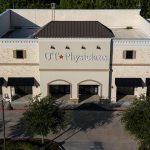The neuromuscular program is focused on providing state-of-the-art clinical care to patients with neuromuscular disorders. Our group of neuromuscular faculty will provide expert diagnosis and management of inflammatory neuropathies for patients who are unable to consult with medical experts in their communities. UT Physicians specialists diagnose and treat Guillain-Barré syndrome (GBS) and chronic inflammatory demyelinating polyneuropathy (CIDP) and variants.
Guillain-Barré syndrome (GBS)
GBS is an autoimmune disorder affecting peripheral nerves. GBS is the most common cause of acute flaccid paralysis. The symptoms start rapidly and typically include numbness, tingling, and weakness that often starts in the legs and spreads to other parts of the body, including arms, respiratory, and facial muscles. In some patients, this is a life-threatening condition due to weakness of respiratory muscles and autonomic disturbances affecting heart and blood pressure. About one-third of patients require respiratory support with a ventilator during the course of GBS. Virtually all patients diagnosed with GBS require admission to the hospital. Nerve conductions, lumbar puncture, and blood workup are performed to confirm the diagnosis and exclude other conditions that can mimic GBS. There are two immunomodulatory treatments, plasma exchange and IVIG, which have been shown to be beneficial in clinical trials that are administered to patients with GBS.
Chronic inflammatory demyelinating polyneuropathy (CIDP)
CIDP is a chronic disorder affecting peripheral nerves. This is also considered an autoimmune disease in which immune effectors attack and injure the covering of the nerves called myelin. Clinically, patients experience progressive muscle weakness, sensory disturbances such as tingling and numbness, and walking difficulty. In typical cases, symptoms progress over two or more months. Neurological evaluation includes nerve conduction and EMG test, spinal tap, blood and urine testing, and in some cases, nerve and muscle biopsy to confirm the diagnosis and exclude other conditions that can resemble CIDP. Chronic treatment is often necessary, and primary medications include corticosteroids such as prednisone, IVIG, and plasma exchange. In some patients, use of chemotherapeutic agents is necessary to control the disease. In the majority of patients, workup and treatment can be performed on an outpatient basis.
Scope of expertise
- Immune-mediated neuropathy
- Neuromuscular disorders
- Neuromuscular junction disorders
- Neuropathology
- Polyneuropathy
- Peripheral nerve injuries
- Plexus disorders
Procedures
- Nerve conduction study and electromyography (EMG) for evaluation of peripheral nervous system, neuromuscular junction, and muscle disorders
- Nerve and muscle biopsies
Research
As faculty members at McGovern Medical School, our team is working to solve the greatest medical challenges of our time.
Qualified patients are able to enroll in a range of clinical trials for both investigational drugs and procedures.
Visit our clinical trials information to learn more.






